#each thing diametrically opposed to itself
Text
You transfathom
colorpush, numbertoss, misconception,
many
say:
it's you, we disknow it,
many negate themselves on you,
you who affirm them one by
one for yourself,
insurrectionary like
the stonecourage,
given as present to the handsaid,
who raised himself to the world
at the seam of the turned silence
and of all danger.
– Paul Celan, "[You transfathom]", trans. Pierre Joris
#each thing diametrically opposed to itself#the living are incomparable#god#paul celan#poetry#pierre joris
3 notes
·
View notes
Note
Hi! I have a question to ask you, someone who seems well versed in Marxism and its philosophy, over something that personally confuses me: is there a meaningful difference between materialism and objectivity? The way I've seen the former explained usually just makes me go "Oh, so it's really just about being objective", so I don't really understand why we need another term for it.
i actually think that there is -- at least in the marxist sense of materialism -- a huge gap between being 'materialist' and being 'objective'. a big part of the historical materialist rejection of idealism is the rejection of the idea of timeless, objective truth independent of its observer and context: as engels puts it in socialism: utopian & scientific:
As each one’s special kind of absolute truth, reason, and justice is again conditioned by his subjective understanding, his conditions of existence, the measure of his knowledge and his intellectual training, there is no other ending possible in this conflict of absolute truths than that they shall be mutually exclusive of one another.
the marxist perspective is inherently suspicious of objectivity, because the marxist analysis of society is cognizant of class struggle. because the goals of the bourgeoisie and the proletariat (or the king and the peasant, or the slaveholder and the slave) are diametrically opposed, there is very little that can be said to be 'universal', because the system of values that benefits one class is to the detriment of the other. marx summarizes this thusly in the german ideology:
For each new class which puts itself in the place of one ruling before it, is compelled, merely in order to carry through its aim, to represent its interest as the common interest of all the members of society, that is, expressed in ideal form: it has to give its ideas the form of universality, and represent them as the only rational, universally valid ones.
so the basic premise of historical materialism is that ideas (i.e. 'truths') arise from the material conditions in which they are developed. there is no such thing as an objective perspective because every perspective is situated historically in a particular time and place and set of social relations. claims to 'objectivity', then, are at best suspect, staking a claim to universality that erases class divisions and historical context.
marxism is not an 'objective' framework--it is proletarian, built from the standpoint of the working class and imperialised peoples around the world, and built upon and adapted for dozens of different historical circumstances by different leaders and thinkers. materialism is in opposition to the notion of objectivity, then, because materialism recognizes that all ideas (even one's own conception of materialism!) are ideas that stem out of dialectical interplay between not only previous ideas but the material and social conditions of the people who have those ideas. ideas and thoughts cannot be 'objective', under the materialist view, because to separate them from the context in which they arose is to distort and falsify them in the pursuit of universality.
357 notes
·
View notes
Text
One of the things that fascinates me, thematically, about wizards in D&D is the consciousness of their interactions with magic. They learn their craft by study, by conscious thought. And they choose their school, too, by conscious thought. When you make a wizard, you choose what elements of magic they choose to prioritise. What draws them, what repels them, what do they rely on, what do they seek out. The choice of school is as much a characterisation detail as anything else. It’s not just a case of learning spells by rote out of a book (well, no, it can be, but that’s probably a discussion in and of itself). Wizards are the class where you can dig in and get nerdy. There’s magical theory up in this joint.
The eight schools in themselves are also an interest mesh of themes and rationalisations, and that makes sense from a Doylist perspectives, because the game designers are choosing schools and effects outside the game, but it also works from a Watsonian perspective, because these are in-universe classifications based on what wizards assume is how magic works. All the spells are tied to a school, and thus the eight-school classification system, even if there are wizards who aren’t. And with any system of classification, there are arguments. Which is, of course, the fun of it.
So. With that in mind. Eight schools. Abjuration. Conjuration. Divination. Enchantment. Evocation. Illusion. Necromancy. Transmutation. Some essay questions slash thought experiments slash personality quizzes for student wizards in a D&D world, focusing on the classification of magic:
If you were choosing (or have chosen) a school of magic to specialise in, what would it be?
What do you think is the overriding purpose of your school of magic?
What element of your school of magic excites you the most?
What is one common derogatory misconception about your school that makes you angry?
What’s one spell of your school that you think should belong to another school? Explain your reasoning.
What’s one spell of a different school that you think should belong to yours? Explain your reasoning.
What would you consider the school of magic most diametrically opposed to your own? Explain your reasoning.
What would you consider the school of magic most similar to your own? Explain your reasoning.
Name one area of overlap or potential overlap between your school of magic and each of the other seven.
Name one area of conflict or potential conflict between your school and each of the other seven.
Which other school of magic would you consider it necessary of have a good understanding of in order to better study your own?
If you were grouping the eight schools into subgroups, what would the groups be, which schools would they include, and why?
Do you consider the purpose of magic to be useful or to be extraordinary? Which schools do you think best match each outlook?
What do you consider the primary ethical concerns with your school of magic? What would you consider the primary ethical concerns with each of the other schools?
Which school of magic do you find most difficult or unpleasant to work with? Why?
Which school of magic do you find easiest and most reassuring to work with? Why?
What is one question about the workings of each school of magic that keeps you up at night?
Do you think that magic should be divided into schools at all? If you think that it should, do you think that the eight schools currently agreed upon are the most accurate choices, or do you believe that they should be rearranged or replaced?
Do you believe that rigid classification aids or hinders the understanding of magic as a whole? Explain your reasoning.
Do you think that a spell should be considered part of a school of magic based on its effect, or based on the methods or rationale that created it, or based on some other criteria?
Is there a school of magic that you considered to be particularly badly defined? Is there a school that you consider particularly well defined? Do you consider this a clarifying factor or a limiting one?
Which school of magic do you most want to disassemble to base parts and understand the workings of? Is this the same school you are happiest using, or a different one?
What is your favourite spell that you have learned of? Is that spell of your own school or a different one?
What is one spell of your least liked school of magic that you consider worthwhile, and why?
What is one spell that you think should never have been invented, and why?
And, finally, just for fun and so everyone knows where we all stand: which school of magic do you find the adherents of most annoying? Not necessarily the school you think shouldn’t exist, but the one where when you meet a wizard of that school, you kneejerk want to punch them in the face, just because?
#d&d#wizards#schools of magic#the eight schools#magical theory#essay questions to get asked in wizard college#i'm having a surprising amount of thoughts on conjuration
251 notes
·
View notes
Text
Round 2 - Side A: Poll 4 of 4
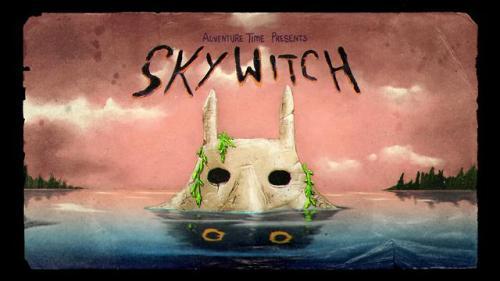
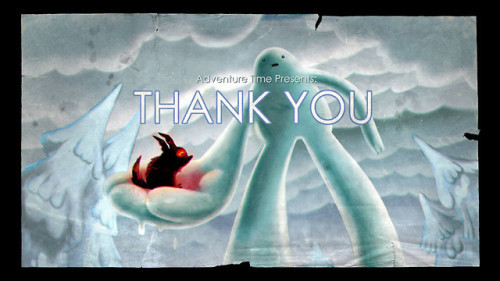
Sky Witch:
Marceline is on a top-secret mission tracking Maja the Sky Witch. But when she loses the witch’s trail, Marceline turns to Princess Bubblegum for help.
Thank You:
The Snow Golem visits the border between the Fire Kingdom and the Ice Kingdom and discovers a lost fire wolf that needed the golem’s help to get home.
propaganda under the cut
Sky Witch:
of all the bubbline classics (tm) of the show, this episode is one of the best in the series, in showcasing the bittersweet, tenuous relationship these two are starting to forge in the aftermath of what was missing. there is still so much to unpack, in regards of both how they view themselves and each other. however. marceline will still ask bonnie for help. and bonnie will still help marceline regardless, because how could she not? despite everything, they will come back for each other (as varmints will tell us), even if they both are not completely over the hurt they caused each other, hanging bitter throughout the episode, making them lash out. yet, bonnie will give away the shirt marceline literally threw at her at a random concert, before even knowing each other, that she kept for years and treasured so much to wear daily and nightly, just because of how much hambo meant to marceline, just to make her happy; because, how could she not? like.....c'mon. the fact that the shirt itself is hundreds of times more powerful than hambo, like c'mon. vote just for the sheer yuri insanity.
What Was Missing may have invented bubbline, but I wanted to make sure Sky Witch got nominated because this is the moment where it really clicked for me. It felt validating, like the subtext people got from WWM wasn’t just fans looking too hard into things. Something shifted in my brain after this that turned me from an Enjoyer of the show to a super-fan.
Thank You:
I didn’t get this one as a teen, but it’s grown on me a lot. The theme of “even forces that seem diametrically opposed don’t have to be at odds, everyone deserves a little kindness” plus the quiet mood of the episode make it feel very special to me now.
#adventure time#atimers#fionna and cake#princess bubblegum#marceline abadeer#tournament poll#round 2
38 notes
·
View notes
Text
apologies to all of my followers but i'm gonna continue being insane abt ff14. no end in sight. hope everyone bothered by that has blocked the tag by now
anyway anytime i say literally anything abt zenos' narrative position i feel the need to preface it with a VERY large "ymmv dependent on your wol" disclaimer bc even if it's got nothing to do with shana and is entirely canon based i know the degree of like. reciprocity there. varies wildly. anyway pretend i said that better the important thing is i'm yes-anding his bit. anyway
ANYWAY i think zenos and ardbert are really great narrative parallels.
like, to both of them, the wol is their only friend and equal. both of them share or believe they share a kind of experience and mentality with you that basically nobody else could understand. both of them show up after all of your other friends/allies have been completely stomped by an expansion's final boss, while you're the last one dragging yourself forward, to be the one who helps you to victory. they both, in some sense, give their life to you (ardbert gives his remaining aether to put your soul back together, zenos cuts his head off rather than live outside your fight and then rides to the end of reality for you later if you don't want to count that one). they both get their dead body possessed by elidibus, which is more of a "two nickels" thing than a total parallel but i think it's fun so i'm putting it here anyway. they both serve as both enemies and allies at different points in the story without changing their core mission statement much at all.
they are also diametric opposites. obviously.
i think to a degree they are expressions/mirrors of two semi-opposing sides of the wol. The Hero and The Hunter. ardbert is the other half of your soul, the warrior of light, and by his own admission his favorite part of the job was never the battle itself, it was the calm that came afterwards. the warmth and security of knowing they'd helped and protected people. he lives and dies by those bonds - he's got a whole party behind him, and they all choose to give their lives twice over to try and give norvrandt a tomorrow. his stand with you is him remembering that fact, reaffirming his desire to help them despite the struggles. he cares deeply abt the world, abt giving them hope. your fight against hades is a manifestation of that determination. you'll drag each other up no matter how much it hurts because goddammit this world is yours and you are not going to stand by and let it die.
zenos by contrast is nothing so lofty. he does not give a flying fuck about people's hopes, or pain, or any of their emotions, or the general concept of tomorrow. he is the part of the wol that is the hunter, the person they become in the heat of battle that scares the shit out of their enemies. the one who finds joy in their work not bc they know it's bringing hope and light to the world but purely bc of the thrill of it. you are an adventurer—you wouldn't do what you do if you didn't find some pleasure in it. his bond with you is completely inextricable from your capacity for violence. he throws off the endsinger's despair not bc he gives you hope but bc hope and despair are foreign objects to him. he reminds you that your friends, the star, the hopes and dreams of reality are all outside the room, and inside it is just you, and your enemy, and you are nothing before you are death to your enemies. so why the fuck is it not dead yet.
like, you could make the case that it's the Best and the Worst, but i think that's only circumstantially true bc again: the wol couldn't be the wol, couldn't keep fighting and winning the way they do, if that part of them wasn't there. but i DO think it is a very present duality, that they reflect matching and opposite parts of you—the part that fights for love of the world, and the part that does it for love of the game.
#the nemesis speaks#swift plays ff14#ffxiv spoilers#endwalker spoilers#like so many spoilers#i thought abt putting this under a readmore but then: i didn't#read my essay boy.#also so so many thoughts abt shana specifically that i kind of want to type up but also. nobody is here for this lmfao#AND ALSO one of these days i'm gonna write that whole thing abt the narrative reprecussions of zenos showing up for you#it's got layers. one of them was this thing. there's others.
10 notes
·
View notes
Text
Another general fandom thing I've been thinking about lately is the extent to which our attitudes are shaped by opposition rather than just liking things.
This extends beyond fandom, of course, but I do feel that the broad dynamics of fandom are increasingly shaped by opposing things we don't like or people we find grating or worse. I'm very conscious of the "ugh at that, I'm going to do the exact opposite" impulse, because I'm a very contrary person by nature and I have to deliberately push against a tendency to have my perceptions (not just activities) shaped by that.
I mean, sometimes we dislike some trend or fanon or whatever because it's diametrically opposed to how we see things or what we like or find acceptable, so it's very natural to dig our heels in. But there's a really common phenomenon, for instance, of "I didn't really care about [whatever], but the fans are so awful that now I hate it." And I have absolutely been there—I'm not excluding myself at all.
But there's still something sad to me about people we find obnoxious actually managing to change our feelings about things and shape what we think about them to such a degree—even though their behavior often has nothing to do with the quality or morality of the thing.
It's one thing if you already dislike something, and then fans/opponents of that thing reinforce what you already thought. But when that actually causes you to think something different than you did, than you would have without them, it's—there's something very uncomfortable about that to me.
Additionally, I think it creates these kind of drastic backlash cycles that can be kind of exhausting. This isn't new in itself, but it feels to me like it's been more rapid and more extreme over the last few years (which may not be an accurate perception; that's just my impression). And this is not always just about annoying and inescapable fanons and the like, but responses to actually bad things.
For an example I'm really familiar with as a lesbian, homophobes in and outside of fandom tend to perceive same-sex relationships as in some way more sexual than het ones and more depraved, corrupt, and/or exploitative. And one of the ways that fans (sometimes queer fans, sometimes not, but well-intentioned) will often respond to this is by a total rejection of that narrative and creating or advocating for depictions of same-sex relationships that are wholesome, soft, and "pure."
And it's not uncommon for those reactive depictions to get pushed forward as the right kind of ships or content to the point that they're presented as the only way to be queer in fandom or to represent queerness, and you end up with people talking like anything this side of Candyland is impure or problematic or grimdark or whatever.
And the thing is—some of those people genuinely prefer the soft bubblegum kind of content for varying reasons, and would have preferred it or created it regardless. That happens! It's not really fair to impose that preference on everyone else (nor fair to deny its validity for some!), but okay. However. A a lot of the time, it gets really caught up in being so much of a rejection of the standard homophobic narrative rather than its own separate thing that it can feel like even things we do for fun are being shaped by homophobes' values and ideas, and we're pressuring each other based on cycles of backlash to them more than expressing ourselves in our own hobbies.
And I feel like this happens in a lot of ways, ranging from very serious concerns like that to "ugh, that fanon is so annoying, I'm going to do its opposite because I can." And it can be difficult to even tell the difference between things we like because we like them, and things we "like" because they annoy people we dislike or at least contradict the things we dislike. A certain amount of pushback to dominant narratives is healthy and appealing, but ... idk. I think it's something to be wary of, too.
65 notes
·
View notes
Note
thomally (i swear i can’t ever remember the ship name for thomas x gally). not a huge fan of it but i wanna know your opinion
FUNNY YOU SHOULD ASK — thomally is one of my all time favorite tmr ships!!!! 😍
genuinely met some of my closest friends bc of that ship — even crossed the big pond to meet ‘em so yeah it’s always gonna be very near and dear to my heart 🥹♥️
as for the ship itself, i just think it’s spectacular! the same way thomesa is, i think thomally is a perfect „two sides of the same coin“ ship which just intrinsically makes me weak in the knees.
both thomas and gally want to protect and ultimately save the people around them—but how they go about it is diametrically opposed.
they’re opposites in so many ways—thomas breaks rules where gally enforces them brutally, thomas urges people to go while gally wants them to stay. thomas wrecks the things gally built, carefully and with his own hands (while ironically, thomas was the one who built the maze itself).
like if you see it from gally‘s point of view, thomas shows up, and he starts tearing apart everything gally built and stands for. gally cares so so much about his fellow gladers—think of the way his voice breaks when he says „i dont want to cross anymore ways off this wall.“ gally knows they’re situation is fucked up, but he has tried so so hard over the 3 years he’s been at the glade to make it into a place that’s worth living in still.
privately i also think the reason why they go up in flames against each other so quickly is bc they’re both instantly attracted to each other, but they don’t understand what that feeling is they’re feeling. so it comes out as aggression instead of friendliness and affection, because while thomas wants gally to like him, and go along with him, gally opposed him at every step.
and i think for gally it’s the fact that he clocks very quickly that thomas isn’t someone he’s going to be able to protect. and that’s a horrible feeling to gally because protecting people is what he does, but also bc he’s feeling that aforementioned undefinable feeling he hasn’t felt before that he doesn’t know yet is attraction….
perfect thomally songs are:
and
the best place to start reading thomally is the 2015 classic apelsin (i hope you’re of age lol, it’s explicit. if not ill hook you up with another rec np 😎):
or actually, let me provide a sfw gem right away: my beloved secret santa gift from 2021 by my equally beloved @crestfallercanyon „these truths unbound and ripe for burning“
#HaHA this got out of hand! 😃#thomally#maze runner#tmr#the maze runner#tmr gally#tmr thomas#ask#tea answers#ship ask game#ask game#crest#long post
12 notes
·
View notes
Text
NaNoWriMo Day 5
It had been a long time since Shadriel had communed with the anima collective. He couldn’t do it directly – his demon essence kept the plane from him as surely as the anima collective’s combined energies kept their plane closed unto itself-- but through the spirits of intellect he’d managed to lure and collect to his cause, information could flow. And anima always followed thought wherever there was an opening, as surely as water flowed downhill through any cracks.
So Shadriel sat, tucked safely behind several circles of warding, a bevy of guards at the doors, and simply thought, letting the pieces of his conundrum flow out into the web of intellect spirits he’d cast into the wide world.
I have a seer, but no path to the Oracles. She has a guardian, strong and dedicated, but no real power to Defend her. I have a man who seeks Death, but leaves only dead bodies in his wake. He had a body that cannot die, at least not by any weakness he’s been able to discover.
Bit by bit, he began to feel eyes upon him. They weren’t proper eyes, of course; one would have to have to have a physical form to have eyes. But the anima collective was all made up of being who had once had eyes, and they remembered their former forms, though they disdained the limitations of flesh. As a being of pure flesh and physicality, Shadriel was surprised he’d been able to get their attention at all. Anima and Demons were diametrically opposed, just as Benevolents and Destinies were. It was only the planar paring of Oracles and Enforcers that worked in tandem rather than at odds. But the two sects of Destinies argued enough amongst themselves to make up for the harmony between the Oracles and Enforcers.
The eyes began to drift, annoyed that Shadriel’s thoughts were full of things well and commonly known. He shifted his focus back to the problem at hand.
The man who seeks Death but cannot die was made that way by the Shining ones. A shiver of outrage went through the collective at the thought of the kin that had cast them out, had bound them to a world of sticks and mud and so changed them. Or rather, inspired them to change themselves to escape it. There was a glimmer of possibility there, in the anima’s attempt to escape the binding curse by escaping physicality all together. It hadn’t worked, but the idea was worth turning over, even though it wasn’t quite fully formed.
Several anima scurried away with it, pleased with this offering and eager to ponder the burgeoning idea from every angle. Shad let it go, attaching an intellect spirit to each one, to be sure the information flowed back to him as they made their discoveries. He pressed on.
A body is an easy thing to change. Agreement, an echo of the opinion that bodies should be cast off all together, but consensus that their nature was highly malleable. Gods, it was dizzying thinking like this. Smugness that his singular mind could not keep up. Shad dismissed it. He liked being his own individual. He continued in his own singular train of thought.
Fate is not an easy thing to change. Annoyance at the interference of the other planars; Destinies and Oracles and Enforcers alike both worked to shape the world to suit their purposes, though with very different methods. Destinies read the threads of Fate woven by Ksm, a cosmic force personified as a weaving woman. One sect worked to support individuals with notable threads, the other worked to ensure the threads of the overall patterns stayed strong and true. They often butted heads with one another, as no one Destiny had all the pieces. Oracles had all the pieces, and set in stone certain immutable facts about the universe. Enforcers went out and made sure those facts remained so. Again, bored anima drifted away from the demon’s stating of the obvious.
But it can be shifted.
All in all, fate magic was a wretched stalemate. The best one could hope for was to hand a fate off to a different individual, dodging the worst for yourself by passing the buck. Such was the nature of luck magic. But if such workings were not done carefully, if balance was not maintained--
Threads snapped, balances shifted, accounts settled, Shining Ones come and must be answered to.
The collective was impatient enough with him to shout in a nearly unified voice. The last time the Shining Ones had had to intervene, the chimera and faeries had been born. Of those faeries, the Mente Court was starting to encroach on Anima territory. They could weave and bend the mind, manipulating thoughts and experiences like light through a prism, paint on a canvas, waves on the shore. The anima did not like these new faeries. They wished them gone.
What has been set by the Shining Ones must be, Shad thought carefully. But what they cannot see they cannot demand an accounting of. With an Oracle of our own, we could learn to work in the dark places of their sight.
A resounding cry of agreement and exultation went up, and several anima flooded along his intellect spirits to ride with them out into the world. He had found a seer with only those weak spirits. With anima bent to the cause, they would find an Oracle. One who wished to see what was not meant to be seen. One who could be tempted by their offer.
Shadriel opened his eyes and took a moment to ground himself in the physical world. He dropped his circles, opened the door to his chambers, and pulled one of the guards off the door and into his bed, where he put every inch of his wonderful body to use, and gloried in the pleasure of having it.
Day 1
4 notes
·
View notes
Text
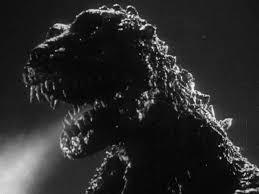
If there are two things I love its monsters and nuclear radiation/fallout. Godzilla is and always has been a perfect marriage of these two hyperfixations of mine. I've seen this Godzilla a handful of times over the years and I love it every single time I watch it. (And, fun fact, strontium-90 was one of the isotopes released during Chernobyl though it's not the one that's mostly to blame for the tragedy that happened).
There are so many goofy things that happen in this movie that seem like plot holes but are actually what I feel like what people would really do in a situation like this. For example, they hypothesize that Godzilla was woken up because of the hydrogen bombs and their answer to fighting Godzilla off is... bombing them. You think a depth charge would do more damage than hydrogen bombs? Like, the whole thing is that Godzilla got stronger/empowered by the radiation. Goofy. Another small contradiction is at the beginning when the toothless elder explained that their oral history specified that Godzilla would come on land only if they ate all the available fish, but the villagers would offer a human sacrifice to get a better yield for fishing. It just shows the psyche of humans in an excellent but subtle way, I feel, that really makes the film not entirely fantastical. The humans act human and do dumb human things when faced with something so fantastical. (Also, I love the idea of these oral histories that are so common in human society [coming from a classics major] being used for a badass old mutated dinosaur. It's so close to magical realism I eat that shit up!!!)
Obviously this movie is a critique on what radiation does to society and the monsters the bombs were both specifically to Japanese society as well as civilization as a whole. It warps and mutates things that could, theoretically, be peaceful into abhorrent destructive monsters. Nuclear bombs, hydrogen bombs, etc. all of it are these massive giants that humans created in order to terrorize other humans, because there really is no other reason to create a bomb with these particular isotopes and elements, what have you, besides absolute destruction. You could argue that Godzilla themself is a physical manifestation of the United Status--a giant, irradiated monster that attacked Japanese society--and I think plenty of people have made that comparison. It's an easy one to make and its not something I disagree with necessarily.
Another way you could look at it along the similar vein of what I said above is that Godzilla represents the "what if" that Japanese society likely had during the war. What if the U.S targeted Tokyo instead of Nagasaki or Hiroshima? The other "what if" aspects that I think are very to-the-point in this is the conversations between the two diametrically opposed sides on how to deal with Godzilla.
You have the side that wants to just straight up kill them, which I think lends itself to the Japanese war-mindset that was victory above all else. It's not a strictly Japanese mindset either, because humans really do love killing each other just for funsies or for money. It's also a hypermasculine ideal (in my opinion) that the one with more weapons/is stronger will prevail. They show off their technology and firepower and it's all raaah I'm a tough guy. (This is further argued for when you think about how... someone, I forget who, said that Japan didn't win the war because they were technologically behind. You could argue that making this film is a way for them to get some of that face back like "look, see, we have technology and know how to use it too!" but this isn't something I fully argue for. I can just see how one could).
The other side is fighting for the scientific research aspect. It's specifically stated that it would be good to study Godzilla to see why they are so protected against radiation, which I imagine during the time of the war and afterwards is something the Japanese specifically would want to know the answers to considering they were BOMBED. Radiation was a fairly "recent" discovery too that was a whole ass wild card no one fully understood but played with anyway. Learning from Godzilla how they were able to be protected from radiation would do incredible from the humanist standpoint of protecting the population from greedy overpowered war machines as well as going the marvel route and making some badass superhumans. I could go on about how I feel about both of these view points and I think its a fascinating discussion that we're still having even though this movie is nearly what, 70 years old? Godzilla fucks so hard.
Technical Shit:
Obsessed with the first bit we see of "Godzilla" is the blinding white light of the people on the boat. Obviously, duh, that's the light from the bombs (I believe the term is Cherenkov radiation? The light that the bombs give off. But I'm not 100% sure). The sound design fucks SO hard. Even after multiple viewings of this movie and all the ones that have come after, the original screech of Godzilla is so chilling and powerful. There's a weird jumpcut around 52 min mark with Emiko that was jarring. I did not like that but also its an old movie so I have to give it grace. Similarly the audio throughout is often blown out which is another product of its time, but owie my ears. Again, I love practical effects SO much. They add so much more to a movie in my opinion and Godzilla as mildly silly as they look in this movie still cuts an imposing figure. The sheer destruction throughout. UGH! Chefs kiss. 15/10.
edit: didn't realize but realizing now the parallel between Oppenheimer and Serizawa. do with that what you will.
4 notes
·
View notes
Text
Smol — Today at 11:01 AM
The very essence of Eurocentrism, you can just be engulfed by a fucking wave of it, it's so pungent. The way he is like towards Oriental religions. He's like, oh, you lack this particular aspect of Christianity, therefor your religion is fucking worthless.
Just disgusting.
He sits there, on his thrown of made up gibberish, acting like he's the superior mason to everyone's stone. It is truly the intellectual imperialism, and microfascism of European chauvinism.
Smol — Today at 11:11 AM
Let me jam everything that's happened in history into a noteless, jargon reduced summary of sublimations, which are swirling around within each other for one grand sublimation. The ultimate unity of subject and object in absolute knowing, which is of course pure, non representational, self producing, beyond a mere lifeless indifference of a for itself that is concerned only with grasping things intellectually, unconnected to an in itself in which things are grasped intellectually as present to hand. The in and for itself, the unity of the present to hand, being of the world, and the reflective grasping of the intellect, through its reflection and reactive sublimation, constitute what is for Hegel supposed to be a knowledge free of presuppositions. One which, ironically, presupposes that in order to arrive at this point, you must thoroughly memorize his condensed history, without footnotes, which he hastily scrawled in such a way that his words produce diametrically opposed readings.
But if we can see in Hegel, a desire to be at one with the social order, in a way which is completely reflective, grasping, and a way in which one is at home with one's world, in the way that it is as well as the way it ought to be, one might say one has found the Hegelian seed of freedom. Hegel was a philosopher, who ironically, in spite of writing everything that he writes for freedom, in spite of writing everything he writes as a dialectical struggle between opposites, he negates the unique, he does not inquire about singularity. Hegel, it is believed by some people who I have worked with studying him, worked on the notion of internal difference, as Hyppolite talks about in Logic and Existence. This as well, connects to Heidegger's notion of the shadow of incalculability. I have also heard that the reason Hegel produces such diametrically confused readings, is not reading him in light of differance. Hegel works in the liminal space, where we cannot hold onto dichotomies anymore.
Smol — Today at 11:54 AM
I also wonder why, since subject is substance, we cannot look at world history as a sort of recording surface of the body without organs, the archeological history through which the machinic unconscious records the history of flows on its surface? The history of these flows, together with the conscious awareness which is emergent from sense, and the synthesis which progressively form from flows and partial objects, to the semiotics of the recording surface on the body without organs, of chains of sociohistorical singularities, and finally the emergent properties of intensities and jouissance, which is where global persons coalesce into coherent forms which emerge as shining points through which we things "make sense." That in which we take sense, and put it into the boxes of the recording surface, the individual forming the uniqueness of universal words, and their particular ordering. Originality forming into ossification out of the life, through which it emerged out of construction from subjectivity, and free form of the rhizome, what makes jazz music jazz music. This history, which is at once world historical, and personal on a micropolitical and macro political level, seems to encompass what Hegel envisioned as a part of absolute spirit. But with Deleuze, it is taken to the nth degree, we never get to the absolute knowledge; but for Hegel it seems that some take the absolute not as an end, but rather saying that right now is all that we have, and everything emerges out of that immediacy, through which history is all contained.
I would hope that through creativity we can read Deleuze into Hegel, I mean, he's already alongside Hegel in the idea that propositional philosophy is nonsense. He's not with him with the nth's degree thing, or being against the state, or minoritarian politics I don't think.
The point is, where one philosopher starts, and another one stops, should be a matter of indifference.
0 notes
Photo
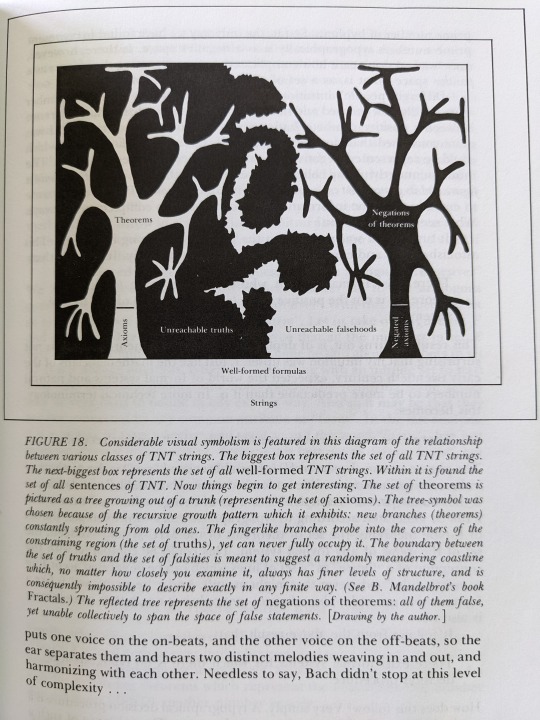
Douglas Hofstadter, Gödel, Escher, Bach
***
The first aspect of Star that I want to consider is the cybernetics contained in it. Let us transcribe Star into the more convenient form of “network/trees constituting the network.”
This is pictured in Fig. 1. On one side (by convention the left) we see a network or mesh of interaction. These are left unspecified: the nodes could be anything at all (molecules, species, concepts, …), and their interconnecting, arrows could be any processes whatsoever (computations rearrangements, transformations, …).
It is assumed that any node could be seen (at: another time, by somebody else) as another network, the initial net could be seen as a node in a larger net. That is: there are no initial or final “elements”; everywhere we led everything has the same meshy appearance. On the right side of Fig. 1 there is a tree of root a in which I have, step by step, drawn the nodes to which a connects, the nodes to which those nodes connect in turn and so on. Had I continued to do this, I would have come back, after a while, to write a again. Thus- the process could go on forever (whence the “…”).
The stages of this procedure are conveniently tracked by 1, 2, 3, …, to indicate the successive depth of the tree.
The way to go from left to right in Fig. 1 is: chop (prune, truncate) at a. That is: take a as if it were an initial element, and proceed as if the time at which this done is zero time. Please note that the act of chopping demands somebody who does it, and sometime to do it. The way to go from right to left is more tricky, hence usually disregarded. If we go down the tree we would pass through the net components once and again, but this is never the initial net, it is still a tree branching and branching.
We can’t get back to the initial net in time. So we must do it by eliminating time, i.e., in eternity. That is: we take this recursion in infinity (a limit process, a leap beyond the time-bound steps). The net re-appears as a fixed point (eigensolution) of this repetitive process.
Thus any finite, time-wise study of the net’s tree is an approximation to the net as a totality. Example: consider the feedback circuit of Fig. 2. In the usual description of it, we start with some initial response x(t0), and then consider what happens at x(t0 + ∆t), and successively at x(t0 + n∆t) (with ∆t perhaps very “small,” infinitesimal). This is depicted below in Fig. 2, in the series 1, 2, 3,.. Consider now this series of cycles around the circuit in contrast with the entire circuit itself. Note first that from the completed circuit one can generate the infinite series of cycles by chopping it at x at some t0, and taking some b as given. Note that this circling around and around will never be different from that; the total circuit will not appear. Thus at some time we stop, we have to stop. But if we take a limit through infinity the circuit is again closed. Thus what we actually do is an approximation, for as much time, and as close as we can get, to the simultaneity suggested in the graphic representation (it looks closed doesn’t it?). But these two things are surely different. By contrast, the circuit’s stability is a timeless property and can be taken as one possible description of the whole system, of its simultaneity, of its closure...
...Thus the net/tree duality is explicitly connected by processes in both directions. We make sense of the Timeless (simultaneous) net by dealing with it in time, Piecemeal. We make sense of the part-by-part approximation of the trees in the net by seeing how they lead to the stability of a simultaneous total system. Hence the pair net/trees is of the form Star *: the it (the net)/the processes leading to it (the trees)...
...In each case the dual elements become effectively complementary: they mutually specify each other. There is no more duality in the sense that they are effectively related; we can contemplate these dual pairs from a metalevel where they become a cognitive unity, a second-order whole.
Note that this superation of duality is no “synthesis” (in the hegelian sense), since there is really nothing “new,” but just a more direct appraisal of how things are put together and related. (The closest I have come to finding a philosophical lineage of this view of dualities, is the Law of Three in the sufi tradition, or the buddhist doctrine of the middle way. There is in both a practice of balance, neglecting nothing, yet in the middle of whatever is going on. It should be more accurately be called the Law of Zero, since every-thing stays just the same.)...
...For every hegelian pair of the form a/not-A there exists a more inclusive Star, where the apparent opposites are components of the right hand side. Another way of saying the same thing is: in hegelian dialectics dual interactions are of the zero-sum form: what one side gets the other side loses. The operational form of interactions seems almost universally to be of zero sum form: every participant can win (by playing the game of the whole).
– Francisco Varela, “Not One, Not Two” (x)
#darkness shining in brightness which brightness could not comprehend#each thing diametrically opposed to itself#dendritic#light/dark#douglas hofstadter#gödel escher bach#become the prey of zero#dialectics#francisco varela#not one not two#limits#negative space
9 notes
·
View notes
Text
Pancaked
A few days ago, I reviewed Glass Onion and, in the opening paragraphed, I addressed Rian Johnson's blunder of a Star Wars film. I laid a great deal of responsibility of that flop on Kathleen Kennedy because I couldn't fathom someone as creative as Johnson, f*cking up a story set in a universe full of space wizards and starships, that bad. It had to be all Kennedy, right? Well, I was wrong. Apparently Johnson knew exactly what he was doing. Kennedy allowed this sh*t to happen but Johnson made the movie he wanted to make. He pulled the trigger on all of that, which is wild because TLJ is so bad. It stands in stark contrast to the ridiculous quality and exceptional writing found in Glass Onion. How could these two films be so diametrically opposed in terms of storytelling? Well, Rian Johnson was doing an interview where he touched upon that travesty of a Star Wars film. It’s a wild interview so I'm just going to quote what this man said:
“I love endings so much that even doing the middle chapter of the trilogy, I tried to give it an ending. A good ending that recontextualizes everything that came before it and makes it a beautiful object unto itself — that’s what makes a movie a movie. It feels like there’s less and less of that.”
See, this single statement is why The Last Jedi is so bad. Now, don’t inherently disagree with this stance. I think that, if executed correctly, this can be an interesting spot from which the next director can create. The problem, and this is a huge one, is when you do this for something that needs cohesion. Star Wars is a franchise where each film ties into the next. If you’re enlisted to create the literal connecting film, the crux of a trilogy, the make-or-break portion of a three film set, you can’t give it a “definitive ending.” That’s not how interconnected storytelling works. You can do that when you’re making a serialized set of films akin to his Knives Out franchise. Those are single, contained, stories that have nods and subtle connecting tissue but are generally closed narratives unto themselves. Star Wars is not that kind of franchise and Johnson should have known that. Someone should have told him “No” the second this goofy ass sentiment left his lips in a meeting. He then goes on to elaborate on this bonkers perspective:
“This whole poisonous idea of creating [intellectual property] has completely seeped into the bedrock of storytelling,” Johnson lamented. “Everyone is just thinking, How do we keep milking it? I love an ending where you burn the Viking boat into the sea.”
Again, i agree wholeheartedly. I’ve watched the MCU kind of devolve into this muddle, ultimately failing to find an identity with Phase Four. The IP took precedence. The grind for Disney+ content forced a sacrifice on that drive to tell great, quality, stories. I’ve said it before that Phase Four is basically Phase One all over again, without any of that unknown potential. The MCU is a machine now and all that content has been churned through a formula causing the brand to suffer. I think Feige understand this and is trying to re-evaluate the overall approach but, even then, none of the Phase Four content is directly connected. None of these things are the connecting junction of a three film series. All of this content is it’s own thing, not the middle story of a three story arc. You can’t “end” a narrative in the middle of the story, just because you feel like the IP you were hired to direct, is being milked. You don’t sabotage a three-film narrative because you feel some kind of way about the creative bankruptcy of Hollywood as a whole. You do that sh*t with your own IP, your own story. You don’t do that to a franchise that is an established IP, an entire universe which has been around for forty years. It’s wild to think Rian Johnson actually thinks this is a positive way to look at his Star Wars film because it’s the Last Jedi that tanked it’s reputation and spiraled Lucasfilm into literally creating show after show after show, effectively milking what good will the fans have left, in order to fix this blunder.
The fault of this cluster ultimately lies at the feet of Kathleen Kennedy. She signed off on every change Johnson made to the overall outline that Abrams hashed out for the sequel trilogy. She was the one who convinced Bob Iger to throw out the outline Lucas gave them for where they should take Luke during the initial merger as well. If Kennedy was actually the steward of this franchise she was supposed to be, She would have made sure to tell this last story with original cast and then made that hard pivot into whatever the f*ck she wanted to do. You don’t let Rian Johnson alienate four decades worth of loyal fans with the third film in your tenure. That’s insane. If she sat down with this man and Johnson said anything close to the sh*t he said in this interview, Kennedy, as the president of Lucasfilm, should have either reeled him in and forced him to adhere to the current outline with the promise of his own trilogy later, or fired the man before that film got made. If at any point Rian Johnson indicated he was going of script, which i imagine he did due to how goddamn oblivious he is in this interviews, Kennedy should have never given him two hundred million dollars to f*ck over the entire Star Wars franchise. Instead, she gave him the keys and he drove the car into a f*cking wall.
It’s nuts to me this dude did what he did to The Last Jedi because he felt like storytelling is being sacrificed in favor of milking IPs, when his movie is what f*cked the story telling of the Sequel Trilogy. The irony is absolutely absurd.

1 note
·
View note
Text
Pancaked
A few days ago, I reviewed Glass Onion and, in the opening paragraphed, I addressed Rian Johnson's blunder of a Star Wars film. I laid a great deal of responsibility of that flop on Kathleen Kennedy because I couldn't fathom someone as creative as Johnson, f*cking up a story set in a universe full of space wizards and starships, that bad. It had to be all Kennedy, right? Well, I was wrong. Apparently Johnson knew exactly what he was doing. Kennedy allowed this sh*t to happen but Johnson made the movie he wanted to make. He pulled the trigger on all of that, which is wild because TLJ is so bad. It stands in stark contrast to the ridiculous quality and exceptional writing found in Glass Onion. How could these two films be so diametrically opposed in terms of storytelling? Well, Rian Johnson was doing an interview where he touched upon that travesty of a Star Wars film. It’s a wild interview so I'm just going to quote what this man said:
“I love endings so much that even doing the middle chapter of the trilogy, I tried to give it an ending. A good ending that recontextualizes everything that came before it and makes it a beautiful object unto itself — that’s what makes a movie a movie. It feels like there’s less and less of that.”
See, this single statement is why The Last Jedi is so bad. Now, don’t inherently disagree with this stance. I think that, if executed correctly, this can be an interesting spot from which the next director can create. The problem, and this is a huge one, is when you do this for something that needs cohesion. Star Wars is a franchise where each film ties into the next. If you’re enlisted to create the literal connecting film, the crux of a trilogy, the make-or-break portion of a three film set, you can’t give it a “definitive ending.” That’s not how interconnected storytelling works. You can do that when you’re making a serialized set of films akin to his Knives Out franchise. Those are single, contained, stories that have nods and subtle connecting tissue but are generally closed narratives unto themselves. Star Wars is not that kind of franchise and Johnson should have known that. Someone should have told him “No” the second this goofy ass sentiment left his lips in a meeting. He then goes on to elaborate on this bonkers perspective:
“This whole poisonous idea of creating [intellectual property] has completely seeped into the bedrock of storytelling,” Johnson lamented. “Everyone is just thinking, How do we keep milking it? I love an ending where you burn the Viking boat into the sea.”
Again, i agree wholeheartedly. I’ve watched the MCU kind of devolve into this muddle, ultimately failing to find an identity with Phase Four. The IP took precedence. The grind for Disney+ content forced a sacrifice on that drive to tell great, quality, stories. I’ve said it before that Phase Four is basically Phase One all over again, without any of that unknown potential. The MCU is a machine now and all that content has been churned through a formula causing the brand to suffer. I think Feige understand this and is trying to re-evaluate the overall approach but, even then, none of the Phase Four content is directly connected. None of these things are the connecting junction of a three film series. All of this content is it’s own thing, not the middle story of a three story arc. You can’t “end” a narrative in the middle of the story, just because you feel like the IP you were hired to direct, is being milked. You don’t sabotage a three-film narrative because you feel some kind of way about the creative bankruptcy of Hollywood as a whole. You do that sh*t with your own IP, your own story. You don’t do that to a franchise that is an established IP, an entire universe which has been around for forty years. It’s wild to think Rian Johnson actually thinks this is a positive way to look at his Star Wars film because it’s the Last Jedi that tanked it’s reputation and spiraled Lucasfilm into literally creating show after show after show, effectively milking what good will the fans have left, in order to fix this blunder.
The fault of this cluster ultimately lies at the feet of Kathleen Kennedy. She signed off on every change Johnson made to the overall outline that Abrams hashed out for the sequel trilogy. She was the one who convinced Bob Iger to throw out the outline Lucas gave them for where they should take Luke during the initial merger as well. If Kennedy was actually the steward of this franchise she was supposed to be, She would have made sure to tell this last story with original cast and then made that hard pivot into whatever the f*ck she wanted to do. You don’t let Rian Johnson alienate four decades worth of loyal fans with the third film in your tenure. That’s insane. If she sat down with this man and Johnson said anything close to the sh*t he said in this interview, Kennedy, as the president of Lucasfilm, should have either reeled him in and forced him to adhere to the current outline with the promise of his own trilogy later, or fired the man before that film got made. If at any point Rian Johnson indicated he was going of script, which i imagine he did due to how goddamn oblivious he is in this interviews, Kennedy should have never given him two hundred million dollars to f*ck over the entire Star Wars franchise. Instead, she gave him the keys and he drove the car into a f*cking wall.
It’s nuts to me this dude did what he did to The Last Jedi because he felt like storytelling is being sacrificed in favor of milking IPs, when his movie is what f*cked the story telling of the Sequel Trilogy. The irony is absolutely absurd.

0 notes
Text
JJK 149. Mai Zen'in
It’s fascinating for a battle shounen manga to have a character like Mai who is diametrically opposed to the ideals of strength and self-improvement that are usually valourized in this genre. Mai doesn't die because she can’t get stronger, but because she doesn’t want to. And although that attitude is evidently incompatible with an existence within the world and situation she found herself in, there is no negative value judgment imposed by the narrative itself condemning her unwillingness to unlock her "full potential".
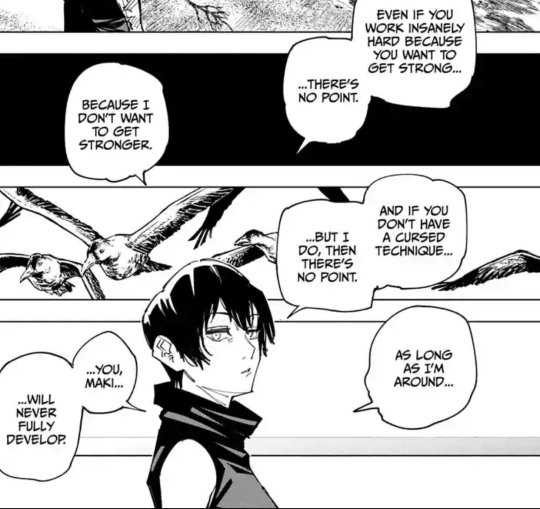
JJK has always foregrounded competing worldviews and how individuals’ different perspectives and values can either coexist or conflict with others. Maki's ambition to transform the Zen'in clan vs. the Zen'ins' regressive conservatism; Gojou's vision for the jujutsu world vs. the higher ups' ; Yuji's "I want to save everyone" vs. Megumi's "I choose who I save" ; Mei Mei's "I'm on the side of money" vs. Nanami leaving a lucrative job to save people out of compassion, and so on.
So it's particularly impressive that, while operating within the shounen genre, the story continues to maintain its respect for this ideological diversity by preserving Mai’s belief in her own worldview to the very end. Simply put, not everyone wants to become powerful even if they may have the potential to. Not everyone wants to live a life of violence, and not everyone wants to be a saviour for others at the direct expense of their own sanity.
It would be perhaps the more optimistic yet potentially oppressive narrative move to demand for Mai's character to undergo a transformation from a character who resists the shounen ideals to one who accepts them. This type of transformation would by no means be inherently negative; I'm definitely not saying that going down this path would have been bad for Mai's character or for the story. But it would succumb to a temptation to move towards a kind of 'sameness' rather than difference in its depiction of ways of acting in the world. I think Mai's ending is all the more striking because it resists this temptation.
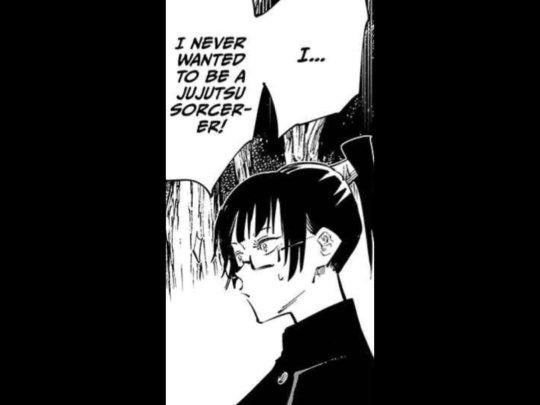
Because I think that the more typical - and optimistic - development arc for Mai would have been for her to learn how to be willing to become stronger as a sorcerer and eventually fight alongside Maki.
But instead, Mai never ends up conforming to those dominant values of strength and ambition. Neither is she subjected to the kind of development traditionally favoured by the genre that are along the lines of, 'you just need to believe in yourself and work hard' -- because if we really think about it, often times a lot of feats in shounen are accomplished by sheer willpower and self-conviction. (JJK is not always an exception to that trope, nor is it necessarily a bad thing!). Mai had previously firmly stated her opposing point of view, and this essential attitude never changes even when we perhaps most expect it to.
In this situation, rather than working to improve her technique to create stronger objects without it costing her life, Mai passively accepts that her weakness will require self-sacrifice.
It’s a fatalistic attitude resulting from having never wanted to partake in a life of violence and hardship.

On the one hand, inflexibility and the inability to adapt are not exactly commendable traits; Mai is certainly fixed in her resignation and refusal to work towards her full potential as a sorcerer. On the other hand, to use Nanami's words, being a sorcerer is shit. All the suffering and regret in the story so far has only continued to reaffirm that sentiment. So we also can't fully condemn Mai for rejecting that way of life to the extent that she would rather sacrifice herself than to push forward to have her own "shounen power-up" moment. Because the aftermath of that would be a path likely filled with death, brutality, and suffering.

The wish to live a normal life is a legitimate and valid one. In an ideal world, her clan would not punish her for it. In an ideal world, opposing perspectives, especially ordinarily pacifist ones like Mai's, would be allowed to exist. Mai having to die because she was unable to escape or adapt to the ruthlessness of the jujutsu world exemplifies how cruel that world is. Mai's persistence in her wish for a normal life, and her "failure" as a sorcerer is not her failure at all; her death reflects a failure of the violently rigid jujutsu clan culture.
In this light, it is all the more tragic that Mai's death was entirely preventable, and fated not by the inevitability of actual "fate", but rather entirely by a radically traditionalist clan system.

At the same time, as I mentioned earlier, I find it impressive for Gege to have allowed Mai to hold onto her values. Just as Maki has always stayed true to her dreams of overturning the Zen'in clan by becoming a powerful sorcerer, Mai has always stayed true to her resistance to that dark and difficult path. From a writing perspective, I think it's interestingly respectful to Mai's character in that way. It's also for this reason that I consider this chapter to be a worthy good-bye to Mai, as she is faithful to her own way of being in the world until the end. It may not conform to the demands of the optimistic self-improvement narrative generally preferred by shounen, but it is a valid perspective, and it is never depicted to be 'lesser than' or 'inferior to' the shounen narrative.
I'm always interested in stories in which there is a genuine dialogue of a diversity of voices, each with their own perspectives and viewpoints even as they conflict with each other - or in other words stories that prioritize 'difference' over 'sameness' in ways of being, thinking, and acting. It's not necessarily uncommon - most if not all stories will feature different character motivations within a given cast. But I think JJK does this particularly well in a particularly convincing way, and 149 is further confirmation of this for me.

Finally, it is notable that Mai herself seems to acknowledge this sentiment. She may have been unwilling to imagine a stronger future version of herself, which is opposite to the advice Gojou had given Megumi if he wanted to reach his full potential. But she died for the sake of believing in the stronger future version of Maki, and this is how she is victorious even in death. All the way to the end, Mai had her way of viewing and acting in the world in her individual way, and Maki had hers; importantly, Mai ends up encourages this difference. Right after she states that "You are me, and I am you", that sameness is undercut when Mai immediately after points to their contrasting motivations:

Mai ultimately encourages Maki to live in the way that Maki wants to live - to the fullest potential of her power and the fullest potential for her capacity to force change upon a corrupt system. Before, Mai had resented Maki for moving on without her ("why didn't you fall down the hole with me?") - she resented how Maki couldn't be the same as her in how she viewed the world. In her final chapter, Mai conversely acknowledged that she herself could never see the world exactly the same as Maki.
Therein lies the cornerstone of her character development; before, she resented that difference between them for those twofold reasons. In the last moments of her life, she no longer resents Maki for moving on without her; she encourages her to move forward into the future. It is of course undeniably tragic, as it must be a future without Mai. And no amount of power gained from such a loss could ever be consolation for that tragedy.
It is fitting, then, that Mai's final message to Maki is full of despair -- yet it is also not without hope. In the interplay between 'construction' and 'destruction', it is ironic yet poetic that Mai wished for her object-construction technique's final and greatest creation to be used to destroy - indeed, to "destroy everything". There is undoubtedly despair both in that command, and in Maki's drive to destruction when she emerges from that room. But somewhere, somehow, there must also be the hope that that destruction will be in the service of "construction", of creating a better future for others, even if it is too late for it to be a future in which they can live in together.
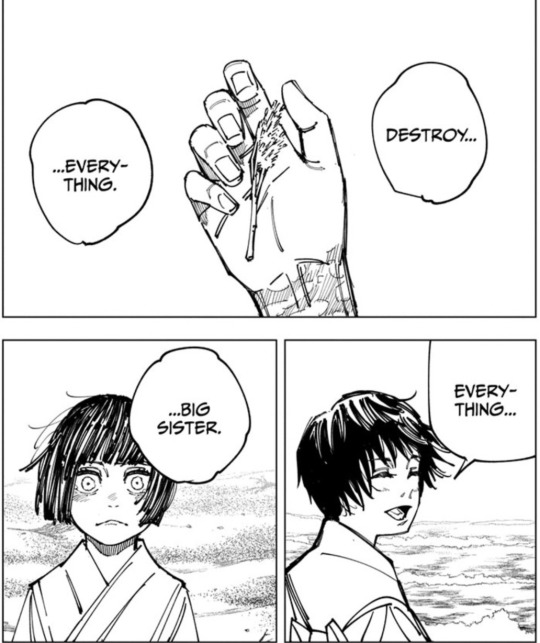
#jjk meta#jjk 149#mai zenin#maki zenin#jjk#jujutsu kaisen#jjk manga#jjk theory#zenin maki#zenin mai#jjk manga spoilers#jjk spoilers
3K notes
·
View notes
Text
SSR Azul Ashengrotto Union Birthday Personal Story: Part 3
"Happy Birthday"
(Part 1) (Part 2) Part 3
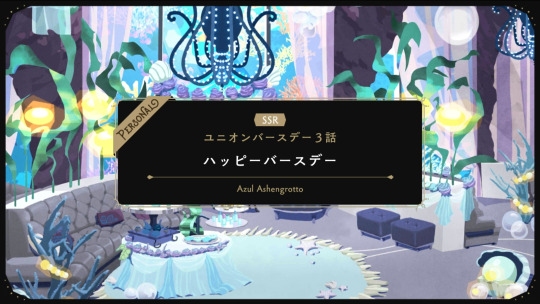
[Octavinelle Dorm – Birthday Party Venue]
Ace: 'Kay, here comes the next one.
Ace: "If you could join any dorm other than Octavinelle, which one would you choose?"
Azul: Let me think… It is something that I have thought about in the past.
Azul: That is, how I would want to place myself into a completely different environment than that of Octavinelle…
Ace: Doesn't every dorm have a different environment from you guys? Y'all have the special distinction of literally being underwater.
Azul: Indeed. Any of the dorms would offer quite the learning experience. Only, I would like to avoid a transfer to Savanaclaw.
Ace: Aaah, I getcha~ The Savanaclaw dorm's all hyped up in their athleticism and're filled with dudes who're really good at sports.
Azul: I made absolutely no mention of athletic abilities! I was merely going to say that the atmosphere of that dormitory would not suit my delicate skin.
Ace: Ack, sorry! Okay, then, so which dorm would you want to go to, Azul-senpai?
Azul: …Well, I suppose it's fine. If I were to transfer to another dorm, I would choose Scarabia.
Azul: To tell you the truth, I have been fascinated with the Scalding Sands for quite a while now.
Azul: My hometown is one of the coldest regions in the Coral Sea. Furthermore, not much light reaches the sea floor.
Azul: Diametrically opposed to that, the Scalding Sands has an abundance of sunshine that reaches across a vast desert.
Azul: The environment itself goes without saying, but our cultural differences are also of great interest to me. There are music and meals that are unique to the Scalding Sands.
Ace: Ah, yeah, the meals that Jamil-senpai would make for us during our basketball club training camps were super delicious with all those spices.
Azul: Oh my. If only I could have partaken in that.
Azul: It is not only the dishes, of course, but their tableware is also quite visually appealing.
Azul: Those vivid and eye-catching colors are rarely seen in my own hometown.
Azul: I had heard that Scarabia is modeled to be similar to that of the Scalding Sands. I would be able to interact with various items actually from there, and…
Azul: I would have frequent opportunities to hear stories from those who came from the Scalding Sands, like Kalim-san and Jamil-san.
Azul: The quickest and most accurate way to study traditions and cultures is to speak to those local to the area. It would be the optimal location for me to gain more knowledge.
Ace: Hmmm… Yeah, but your reason's still packaged a bit too neatly. …I bet you got some kind of scheme hatching in the back of your mind, don’tcha?
Azul: Of course not, how could you possibly think such a thing. …Is what I would say, however…
Azul: As my presenter who is to bring me good fortune, perhaps I shall let you in on a secret.
Azul: The Scalding Sands is known for their high-quality tea leaves, spices, and silk fabrics.
Azul: Each and every one of them are items that would be novel to those in the Coral Sea… Yes, in other words, this is a gold mine!
Azul: If I can further my relationships with students from the Scalding Sands and make connections there, it would be considerably beneficial.
Ace: I knew it!! Crafty, as always.

Ace: And that's it for the questions! Neeeexxxt it's time for that long-awaited-super-awesome "Gift of Good Fortune", riiiiight~?
Azul: Ace-san… You really are quite an easy person to read. This is the largest grin you've sported all day.
Azul: …Sigh. I would have preferred avoiding being covered in cream like this, but as it is tradition, I suppose I'll have to accept it.
Ace: Don't worry, I'll hit you straight on! I got pretty good hand-eye coordination 'cause I'm in the basketball club and all.
Azul: What do you think I’m worried about…? …Ah, please wait one moment. I need to remove my glasses.
Azul: …Sorry to keep you waiting. Well, please go ahead.
Ace: Mmkay, here I gooooo~!
Ace: AZUL-SENPAI! HAPPY BIRTHDAYYYYY!
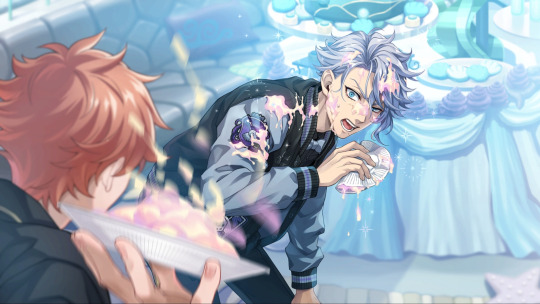
(Part 1) (Part 2) Part 3
#twisted wonderland#twst#azul ashengrotto#ace trappola#twst azul#twst ace#twst translation#mention: jamil#mention: kalim
114 notes
·
View notes
Text
A Brief Unpacking of Soul Society
so writing all this up in a super-detailed fashion with things like supporting evidence and explaining every little point takes a super long-ass time and let’s be real probably nobody is going to sit and argue the finer points with me so while I will eventually substantiate all this I’m going to give the tl;dr which is still going to be extremely long
Willpower
the first thing you need to know is that in Bleach’s universe willpower is pretty much everything (see: Soul Physics) and manifests as a de facto physical force. Aizen tells Soifon that Shinigami battles are battles of will, Hiyori survives being cut in half by Gin because of her will to survive, Ichigo completes Kisuke’s training and cuts Kenpachi because Ichigo discovers his will, Yoruichi says that reaching for power is Ichigo’s instinct, and on and on. there’s a million examples of this. every time Ichigo’s eyes flash blue-white and “Number One” starts playing that is your clue that will is at work for him. willpower is everything. this is why I only sorta joked about Nietzsche but not really because it’s actually dead accurate
Shinigami
the next thing you need to know is that the parallelism between Shinigami, Quincy, and Hollows is ridiculous (see: Bleach’s “Races”, Bleach’s “Races” II, and the power comparison chart) which suggests a common origin although the nature of that is speculative. it is less that they are actually completely different and more that they are competitive facets of the same underlying reality. Shinigami occupy a dominant position because they 1. control the vast majority of the Soul King and 2. the nature of them is “stagnancy” (as revealed through Mimihagi’s power and the name of the Seireitei itself) meaning that they are perfectly positioned to be (and continue) the status quo
The “Shinigami” State
as I began outlining in The “Shinigami” State (Part 1) the country which has been assembled by Shinigami (which I dub Yomi for a lack of something better to call it) “is fundamentally theocratic, feudal, patriarchal, and marked by internecine political competition along class lines. its major class divisions are 1. Great Noble Clans, 2. Nobles, 3. Shinigami, and 4. Peasants. each of these classes is in turn riven into different competing factions (for example at the first level the Shihōin, Shiba, Kuchiki, Tsunayashiro, and Still Unnamed 20 Years Later Fifth Great Noble Clan). these parties all jockey for control among themselves and with each other at every level. there are various parallels to real world feudal societies in this, especially with Japan. the main competition is however between the Great Noble Clans and the Nobles; the Shinigami (nominally led by Yamamoto for much of history) largely positioned themselves as apolitical.
(it is worth noting at this point that what “Shinigami” means is purely contextual. it is both a job, a political class, and a “race”. this shouldn’t be surprising as Japanese is a very contextual language. Great Noble Clan members and Nobles are also “Shinigami” [the “race”] but often use “Shinigami” to refer to the political class or occupation. this confusion is deliberate to muddle these issues, just like the state lacking a name)
both SAFWY (with Azashiro’s backstory revolving around vicious infighting among Nobles) and CFYOW (with Tokinada’s scheming to upend the balance of power between the Great Noble Clans and the Nobles for his own ends) reflect this handily
Power Accumulation
now I’m just going to start asserting things. as can be derived from the above Yomi implicitly views willpower as the only force in the universe worth really cultivating because it’s the only force in the universe that scales well at an individual (human) level. it believes in technological products only in so far as they help with that program. all its science and philosophy is centered around changing the self, not changing the world. in this regard it is diametrically opposed to (our) lived human experience which is embodied in the Living World
Yomi is “Power” hungry, rather than “Energy” hungry. this distinction is crucial. it doesn't really build water wheels or windmills or dams or nuclear power plants or bombs or particle accelerators or washing machines of fridges or air conditioners or anything like that. it is not about augmenting its denizens with external machines, but about improving their selves or creating new selves. it's all people power, not machine power.
thus, the resources it seeks are not energy sources like rivers or coal or oil or uranium with which to run things, nor valuable minerals like gold, iron, or rare earths with which to build things, but populations. it is focused exclusively around the management and exploitation of human souls. souls are the only resource it cares for and all else is luxury. part and parcel of this is continually creating new underclasses to add to its existing class divisions: slaves. examples include artificial souls, mod souls, reigai (Ouko being canonized in SAFWY), and gigai. these slave underclasses serve as both tools and ingredients. a brief summary from “Blade Runner 2049″ (incidentally this is yet another reason Bleach is Cyberpunk):
Niander Wallace: Every leap of civilization was built on the back of a disposable workforce, but I can only make so many.
this disposable workforce includes the regular Shinigami who routinely suffer immense casualties and are treated as utterly expendable. everything that exists in Soul Society exists to control these lower classes.
Power Conflict
you might be wondering what “leap of civilization” all of these developments are building toward. as I’ve pointed out: the main driver of Yomi is the competition between the Great Noble Clans and the Nobles. I’ve laid out before that Great Noble Clan members are generally simply superior in power, focusing upon Yoruichi with the CAT series, but also noting Isshin and Kūkaku here (it’s worth mentioning here that in CFYOW both Harribel and Nelliel observe that Kūkaku is incredibly strong) while there are notable examples who do not originate from their ranks (Yamamoto, Retsu, Kenpachi, Aizen, and Azashiro to name a few) those are the exceptions that prove the rule.
all these scientific developments to improve Shinigami exist to elevate the Nobles to the level of the Great Noble Clans and end that conflict decisively in their favor. this is particularly true of Hollowfication. the Shinigami as a people embody stagnation, and the only reason they seek advancement is to triumph over one another. per chapter 535:
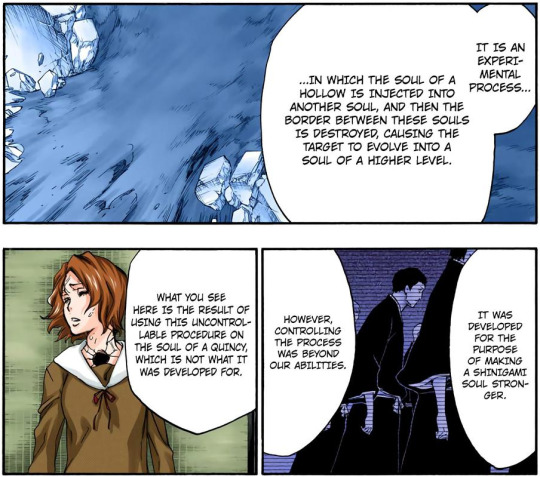
the Nobles (and Great Noble Clans) have gotten a succession of “apolitical” scientists or de facto scientists (like Kirio, Ouko, Kisuke, Aizen, Mayuri, and Seinosuke) to work on various means of powering themselves up in an ever-escalating arms race. (it’s notable that everyone who gets sent to Zero Division is some kind of inventor.) in classic Jurassic Park fashion, “Your scientists were so preoccupied with whether or not they could, they didn’t stop to think if they should.”
Kisuke Urahara
as I just said the scientists caught up in this process are largely apolitical and only concerned with whatever interests them intellectually. probably the most notable advance in this arms race was made by Kisuke with the Hōgyoku. why did he make it? CFYOW offers up some vague reasoning but it’s best to remember that Kisuke is a scientist operating in an environment where the primary resource and field of study is human beings and where there is no regard for human rights or indeed any value accorded to human life: human experimentation is the norm
Kisuke made a research tool to quickly and radically modify the human organism and not a strategic asset. what is the Hōgyoku really? to put it quite simply the Hōgyoku is for biological experiments what catalysts and accelerants are for chemical reactions. it increases rates of change and allows in minutes, hours, or days what would normally take years, decades, or centuries. it is essentially a time machine for a given organism as much as it is a pathway determinant growth engine. it can actualize an entity’s long-term potential in a short timeframe. it basically allows a given individual to timeskip to some future version of themselves as desired as long as that version is possible. the Hōgyoku is an entropy machine: it creates additional data and complexity using energy.
(of course in science you want reversibility whenever possible. you want subtraction along with addition, division along with multiplication, integrals along with derivatives. so if you have an entropy machine you need an anti-entropy machine to complete your tool kit. and you can use your new entropy machine to make anti-entropy "machines". it is notable that all three individuals with anti-entropic abilities, like Rukia with absolute zero violation and information destruction, Orihime with event rejection, and Hachigen with space regression, were all heavily modified by the Hōgyoku. but that’s another story.)
Dual-Use Technology
the thing about technology is that every advance can be used for military purposes as readily as civilian ones. nuclear energy can be used to make reactors or bombs. CRISPR can be used to make high-yield crops or bioweapons. and the more energy-dense technology becomes, the more destructive it can be: a laptop battery has roughly the energy yield of a hand grenade. so you shouldn’t be surprised that the Hōgyoku also makes for a potent weapon.
the Hōgyoku can obviously modify any organism (as we see it work on Shinigami, Hollows, Arrancar, and Fullbringers and Shaz Domino in BRT wanted to use it on himself, a Quincy) but it was made to work with Shinigami first and foremost. now the question is not really “why did Kisuke make the Hōgyoku?” because he made it for whatever personal reasons but rather “who set in motion the historical process of using science to improve themselves for political ends, which Kisuke represents a culmination of?” and the answer is the Nobles.
think about it. the Hōgyoku actualizes potential. the Great Noble Clans already have the most built-in potential and can best actualize it already; they don’t need it. the Shinigami (the political class/job) are highly expendable and Yamamoto has never viewed them as anything more than chaff; they don’t need it. only the Nobles have the mix of need and potential to properly utilize it. (and the Nobles have been behind all these other examples too, like Spearhead for mod-souls and Azashiro’s experiments with improving Shinigami which led to Ouko’s research.)
the Nobles... and Aizen. (and Shaz Domino but he’s not too important here.)
Actualization
it’s notable that most of the villains in Bleach are an example of each of these political classes (Great Noble Clans, Nobles, and Shinigami) trying to conclude the class struggle in some fashion. Tokinada is a member of the Great Noble Clans who wants to position himself at the top to maximize suffering. Azashiro is a Noble who wants to avenge himself and his family against the depredations they suffered. and Aizen, it would certainly seem, is a Shinigami who wanted to stand atop the system (even as he replicated and admired many of its features like its aesthetics and culture). only Yhwach and to some extent Ginjō were truly outsiders.
although the personal motivations of these individuals varied, what they each really represent is the “logical conclusion” of the drive of their respective classes to overthrow or otherwise subvert the others. they are “inevitable” products of this intensely competitive system: eventually an individual will decide to use outside the box solutions to overcome the “rules” of the “game”. in other words they will “cheat”.
Downfall
this is also why these villains lose. as I said at the beginning the Bleach universe relies almost wholly upon personal willpower. a dialogue on the difference between Japanese and American perspectives on weapons is instructive at this point:
The martial philosophy of Japan comes out of Shinto and Buddhist traditions, and so is focused on spiritual attainment and mastery. This philosophy is the legacy of a warrior culture which greatly predates the advent of the gun, and is itself intimately tied with the spiritual life of the nation. The martial ideals of the United States, on the other hand, are the product of Enlightenment philosophy, and thus focus on personal freedom. The nation itself was born by the gun in support of just such principles. But what do these varying culture outlooks mean for gaming? Quite a lot, really, because whether they realize it or not, the cultures in which these developers grew up often influence their games.
In Japanese games, the gun isn’t so much a gun as an extension of the self. The gun is a part of the person, the suit, or the vehicle, and is a representation of internal force rather than a mere firearm. When an actual gun is given to a person it’s often a tool for survival whose use indicates that everything else has gone wrong. Of course there will always be exceptions, though interestingly these exceptions usually star American heroes rather than Japanese ones.
This idea of the weapon as an extension of the self, as channeling inner force rather than relying on external power, is distinctly a Shinto and Buddhist conceptualization. It allows for concepts like Megaman’s internalization of new powers and his need to become a unified whole he can put the world back to the way it was and restore peace. It even allows for games about martial artists who can project fireballs due to their mastery of their art.
it really shouldn’t surprise you that Ichigo and Aizen merge with their zanpakutō during their final confrontation to attain vastly greater power: this is exactly an embodiment of this cultural viewpoint which Yomi itself embodies. what is notable is that Aizen’s use of it is a fake, imperfect mirror of Ichigo’s:
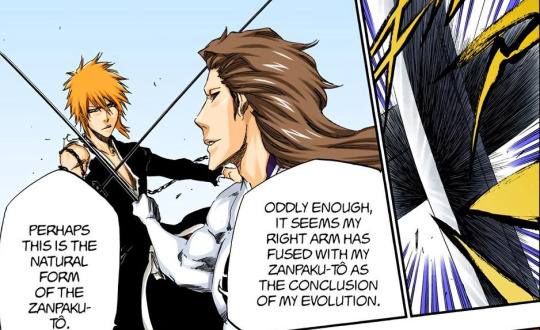
the Hōgyoku mimics what it sees embodied in Ichigo. Aizen has no great awareness of what this means or why it happens. Aizen goes on to attribute his continuing metamorphosis to the Hōgyoku:
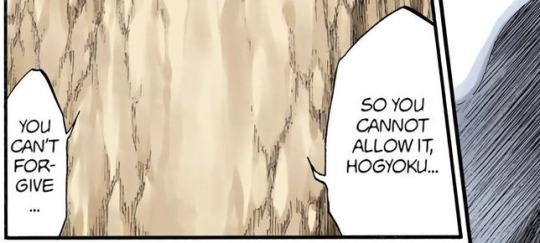
and the Hōgyoku continues to mimic Ichigo and follow what it believes a more transcendent organism ought to look like using him as an example (ironically in the exact same fashion as Ichigo’s bonded Shinigami-Hollow powers, Zangetsu, mimic what a proper zanpakutō ought to be like by copying Isshin):
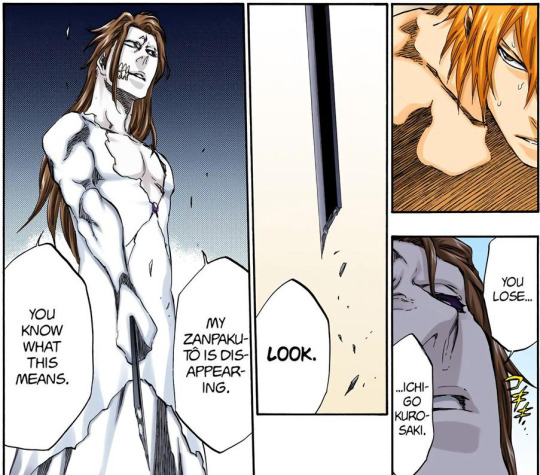
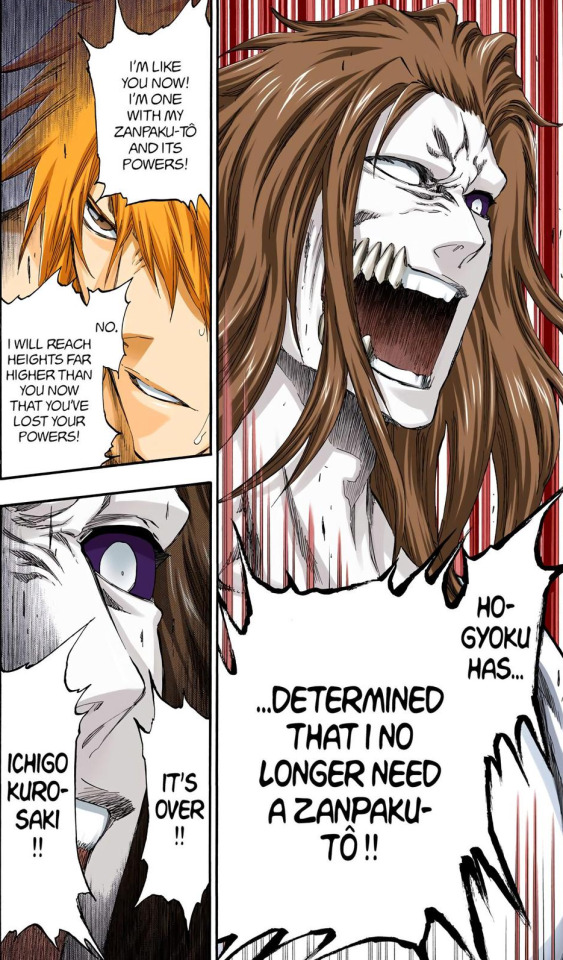
note Aizen’s words here because they precisely spell out his doom: “Hōgyoku has... determined I no longer need a zanpakutō!!” Kisuke’s seal on Aizen activates in the very next moment because Aizen has finally verbally admitted a basic truth:
“Hōgyoku has...”
none of Aizen’s ability to compete with Ichigo is Aizen’s own doing. Aizen is relying on external power rather than channeling his inner force. his willpower is weak and he has broken the basic compact of power in the Bleach universe whereas Ichigo absolutely embodies inner force in a fashion which the Hōgyoku is merely copying and which Aizen cannot sustain. Ichigo’s earlier criticism of Aizen is absolutely correct:
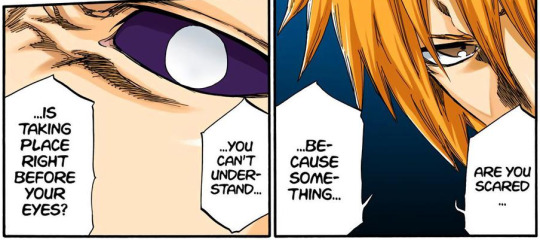
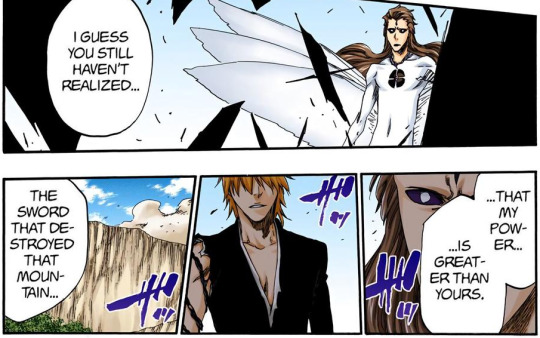

Aizen completely fails to understand the situation. not just tactically (as in the nature of Ichigo’s powers which he is confronting which Aizen repeatedly misidentifies and gets wrong) but in terms of what is happening with his own power. Aizen isn’t even aware that he’s relying on the power of another until it’s too late. this is why he loses.
it is also essentially why Azashiro and Tokinada lose. Azashiro is obsessed with merging with Roka Paramia to gain her powers and Tokinada relies almost entirely upon Hikone Ubuginu and Aura even as he claims there are nothing more than his tools. none of these individuals demonstrate personal mastery of themselves and thus they are ultimately unable to triumph against others with greater wills. their cheating got them nowhere.
Conclusion
the Shinigami state within Soul Society, Yomi, is founded entirely upon class warfare and political competition, and the eternal arms race for ever greater power and domination over others which it encourages frequently results in spasms of conflict and warfare by individuals trying to overcome the endless and intractable deadlock by acquiring power beyond their abilities. this inevitably does them in as they wind up breaking the most basic compact of power in the universe which is that all power flows from within.
the general inability of the Shinigami (the “race” and not the political class/job) to grasp this is the principle reason why Yomi, Soul Society, and the realms in general are seemingly regularly racked with wars: most do not truly understand the basic truth that to master the world one must first master oneself... let alone that in seeking internal harmony one will seek to promote external harmony rather than conquest. this basic misunderstanding is a result of cultural values and drives almost all conflict through the series throughout time
#Out Of Character#Long Post#Bleach#Meta#[ there ]#[ rather than taking ]#[ weeks or months ]#[ there's the general outline ]
46 notes
·
View notes